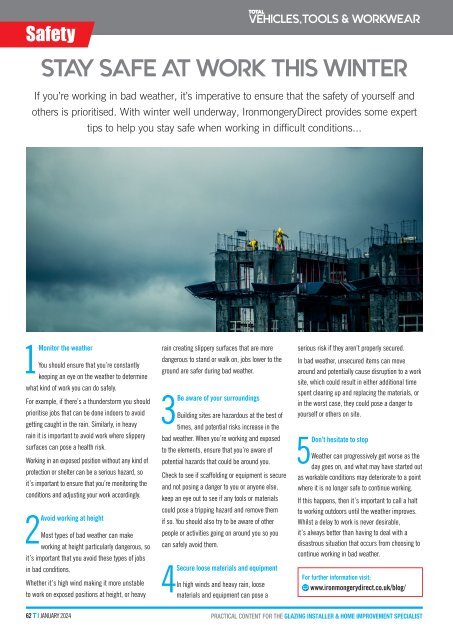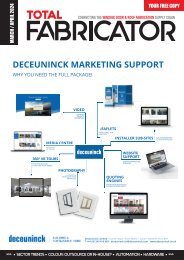January 2024
You also want an ePaper? Increase the reach of your titles
YUMPU automatically turns print PDFs into web optimized ePapers that Google loves.
Safety<br />
STAY SAFE AT WORK THIS WINTER<br />
If you’re working in bad weather, it’s imperative to ensure that the safety of yourself and<br />
others is prioritised. With winter well underway, IronmongeryDirect provides some expert<br />
tips to help you stay safe when working in difficult conditions...<br />
1Monitor the weather<br />
You should ensure that you’re constantly<br />
keeping an eye on the weather to determine<br />
what kind of work you can do safely.<br />
For example, if there’s a thunderstorm you should<br />
prioritise jobs that can be done indoors to avoid<br />
getting caught in the rain. Similarly, in heavy<br />
rain it is important to avoid work where slippery<br />
surfaces can pose a health risk.<br />
Working in an exposed position without any kind of<br />
protection or shelter can be a serious hazard, so<br />
it’s important to ensure that you’re monitoring the<br />
conditions and adjusting your work accordingly.<br />
2Avoid working at height<br />
Most types of bad weather can make<br />
working at height particularly dangerous, so<br />
it’s important that you avoid these types of jobs<br />
in bad conditions.<br />
Whether it’s high wind making it more unstable<br />
to work on exposed positions at height, or heavy<br />
rain creating slippery surfaces that are more<br />
dangerous to stand or walk on, jobs lower to the<br />
ground are safer during bad weather.<br />
3Be aware of your surroundings<br />
Building sites are hazardous at the best of<br />
times, and potential risks increase in the<br />
bad weather. When you’re working and exposed<br />
to the elements, ensure that you’re aware of<br />
potential hazards that could be around you.<br />
Check to see if scaffolding or equipment is secure<br />
and not posing a danger to you or anyone else,<br />
keep an eye out to see if any tools or materials<br />
could pose a tripping hazard and remove them<br />
if so. You should also try to be aware of other<br />
people or activities going on around you so you<br />
can safely avoid them.<br />
4Secure loose materials and equipment<br />
In high winds and heavy rain, loose<br />
materials and equipment can pose a<br />
serious risk if they aren’t properly secured.<br />
In bad weather, unsecured items can move<br />
around and potentially cause disruption to a work<br />
site, which could result in either additional time<br />
spent clearing up and replacing the materials, or<br />
in the worst case, they could pose a danger to<br />
yourself or others on site.<br />
5Don’t hesitate to stop<br />
Weather can progressively get worse as the<br />
day goes on, and what may have started out<br />
as workable conditions may deteriorate to a point<br />
where it is no longer safe to continue working.<br />
If this happens, then it’s important to call a halt<br />
to working outdoors until the weather improves.<br />
Whilst a delay to work is never desirable,<br />
it’s always better than having to deal with a<br />
disastrous situation that occurs from choosing to<br />
continue working in bad weather.<br />
For further information visit:<br />
www.ironmongerydirect.co.uk/blog/<br />
62 T I JANUARY <strong>2024</strong><br />
PRACTICAL CONTENT FOR THE GLAZING INSTALLER & HOME IMPROVEMENT SPECIALIST
















